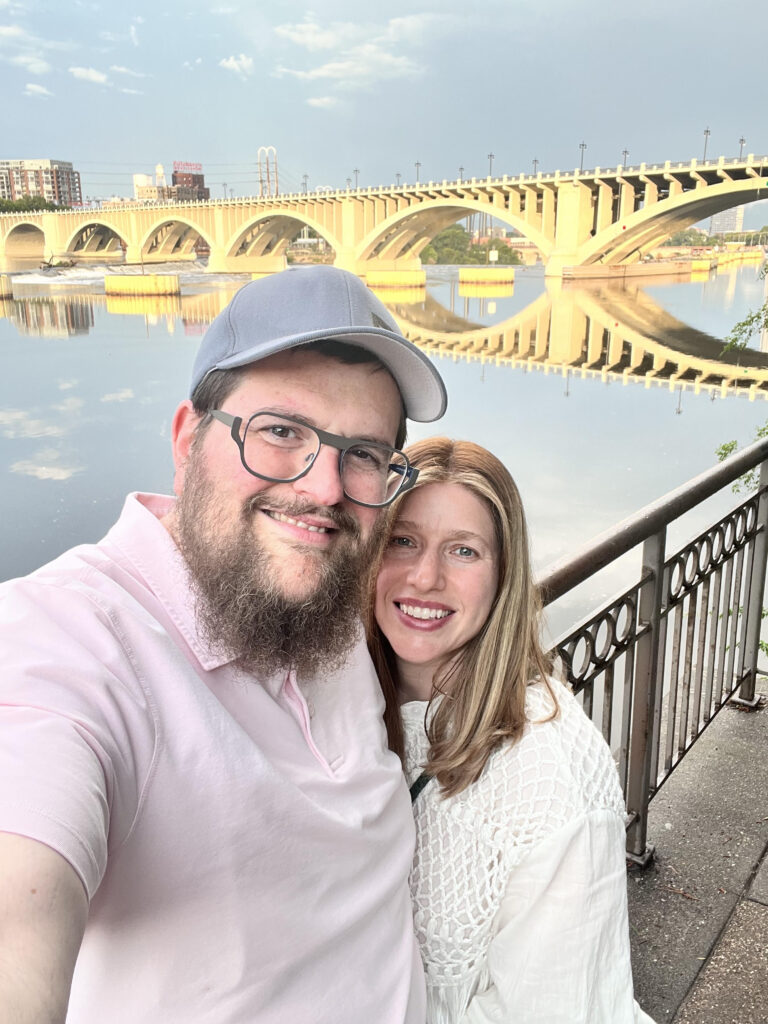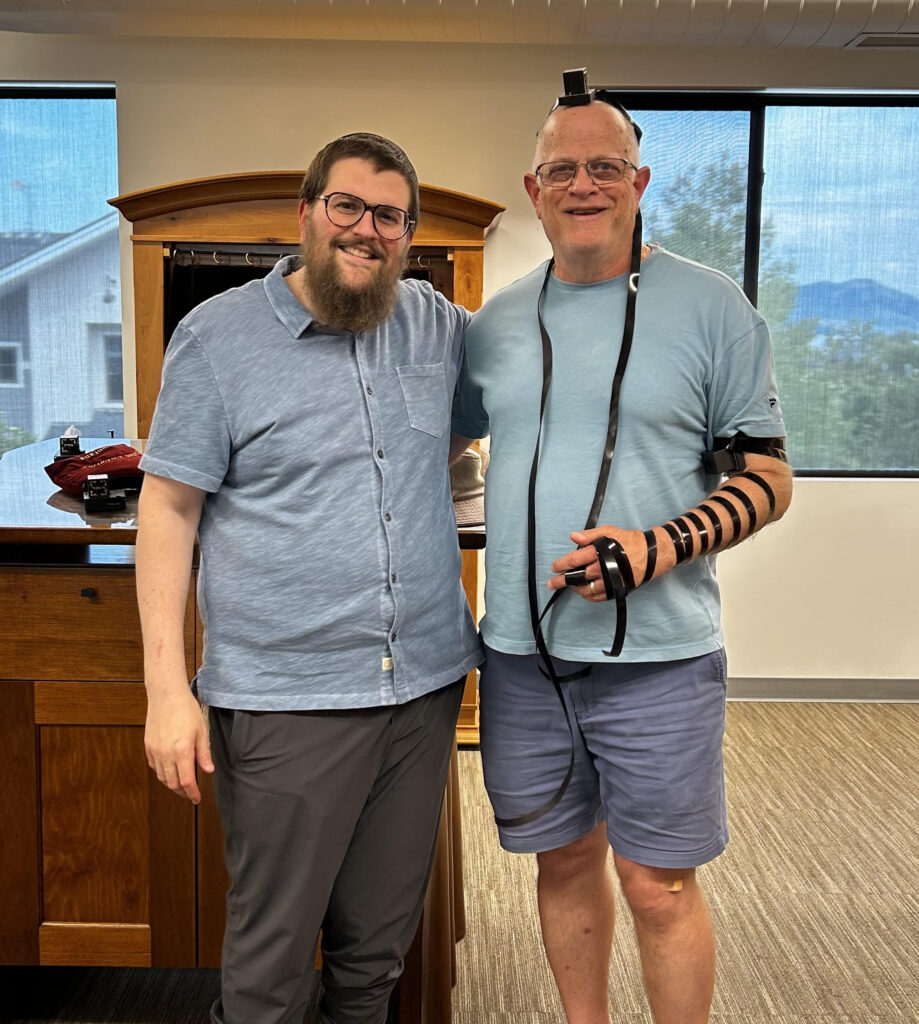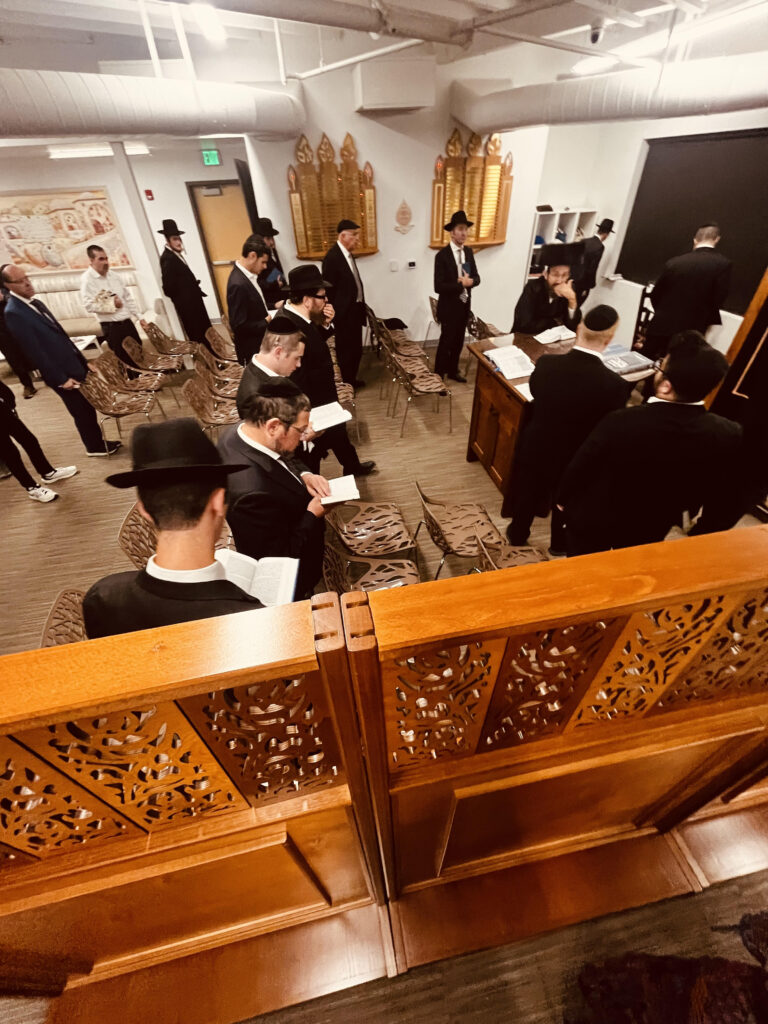Musings Of A Shliach From Montana


Larry “Leibel Berel” laying tefillin while visiting from Tampa
On Monday, Chavie celebrated her 41st birthday and I wanted to celebrate my amazing eishes chayil. So, last week, while the kids attended camps in New York, Mexico, and Kalispell, Montana, we found ourselves “empty nesters” for the week and decided to take a much-needed vacation. I didn’t want to experience the typical flight delays, which are so common when flying from Montana where there is almost always the need for a connecting flight, so we decided on Minnesota, which is a two-hour direct flight, has kosher food, beautiful nature, so off we went.
We ate at the amazing Sato Fusion in St. Louis Park, operated by my soul-brother Meyer Roberts, we enjoyed Stillwater, Minnesota on the St. Croix River, and the Glacial Potholes in Taylor Falls. While in the “big city,” Chavie and I got some good shopping, and we mostly enjoyed the quiet: no kids, no Chabad house, no distractions. It’s an amazing thing for a couple to get some alone time to breathe, to celebrate each other, and to check on so many issues that couples need to resolve for their families, which are hard to do while running around all day like a chicken without a head, just to keep the home afloat.
Of course, I had my cell phone, and I certainly did respond to a few things that needed quick responses, but overall, there was no work while away. I did bring some work with me, but truthfully, once I landed in Minneapolis, I wasn’t in the mood to work; I just wanted to lean in and spend quality time with the woman I married nineteen years ago and with whom I adopted five children and revolutionized Jewish life in Montana. Some days I feel bad for Chavie; it’s hard to be married to a workaholic who wants to “change the world.” But this trip was rejuvenating, and I highly recommend it to any couple that can pull it off. It may be hard to believe because I am a sociable person who teaches and interacts with humans all day, but as a I get older, I’ve started enjoying the quiet more and more and often think of a owning a lake cabin somewhere off the beaten path in Montana, where I can sit and think, write, spend time with Chavie in deep conversation, and turn off the world.
Just a dream.
In this week’s double parshiyos, Matos-Masei, we read about nedarim, the laws of vows. Of course, there is an entire tractate of the Talmud “Nedarim” discussing the intricacies of these laws, but today I want to focus on one mitzvah which is mentioned in our parashah: If a woman made a vow that directly affects her marriage in a negative way, her husband (who heard her making the vow) can annul it on that day. It’s not because he’s more powerful than she is; it’s not because the Torah is chauvinist, chas v’shalom, rather, it’s because they are married and both husband and wife need to keep in mind that many of their decisions can directly affect their union, and whenever possible we must minimize any potential harm to the relationship.
Chavie and I try to have a growth-oriented marriage. I can’t take credit for it, because it’s Chavie who brought that gift to our marriage. She would say, “Maybe we should see a marriage counselor” and I would say, “There’s no point. We’re not crazy or something, we’re fine.” In truth, she always pushed our marriage to be better, and I finally joined her in that goal, and it’s been a huge berachah. We have so much on our plate with raising children that have all different types of unique needs, with running a very busy Chabad Center, catering to hundreds of frum visitors in the summer, and dealing with the normal financial ups and downs like everyone else: it’s a lot to carry. So, the best “blessing” to plow through the storms of life is for husband and wife to be on the same page and that takes work, lots of healthy work. The united force of a healthy, loving, and fired up couple allows us to deal with everything that comes our way and overcome obstacle after obstacle. It doesn’t mean that it’s easy; much of it is really hard, but realizing that we need each other, we can lean on each other, count on each other, and for me to learn how to be there emotionally too makes the survival and growth of our family and Chabad Center possible. Each year when I celebrate Chavie’s birthday and we celebrate our wedding anniversary, I thank Hashem not just for giving me a loving spouse, but for giving me a spouse who wants every day to be a joyous, meaningful, experience.
In Masei we read about the forty-two journeys that Klal Yisroel experienced from the time of the Exodus from Egypt until crossing the Jordan River into Eretz Yisrael. The Rebbe, zt’l, would always emphasize that life is a journey with different stops and experiences along the way. At every location where the Jews encamped, they put up the Mishkan so that their present moment was filled with kedushah, with holiness. It didn’t matter if it was for a day or five years, it didn’t matter if they’d continue the journey fifteen hours later, the Levites would unload the vessels and materials of the Mishkan, erect the holy edifice, and then they’d take it down in time for their next journey.
This is something I think about often, because it’s an aspect of Judaism that is very hard for me, but something that my dear Chavie lives by in a practical manner. We are always so busy planning for the next “thing,” figuring out the next gig or the next vacation or the next project, that we forget to live in the now. I’m reminded of this mindset when dealing with the hundreds of tourist phone calls I answer each summer. 95% are sane, good, people with legitimate questions that I am happy to answer. Questions about minyanim, hotels, Shabbos meals, babies and eruvs, RV parking, kosher food, yahrzeit, etc. Once in a while I am on the receiving end of unhealthy expectations: “You don’t have lodging for people for Shabbos?” or “How much does it cost to eat at your Chabad?” or “How come you don’t have a minyan during the week?” Or as one fellow from New Jersey said to me this week: “I thought Chabad cares and is there to serve?” Despite the 5%, the majority of the Yidden who call are wonderful. I try to answer every call and help them out, because that’s what Hashem put before me at this moment and if I am to be present, I should be fully focused on the person placed in my life right now. These wonderful Jews live in their “shtetel,” take care of their families, and are active in their communities, many of them don’t have TVs, Baruch Hashem, so they don’t watch Yellowstone and have a hard time figuring out how to travel West, so I am happy to help.
I am very good at getting overwhelmed about the next thing on my to-do list and the list is legitimate. Yet, there is truly no better place to be than in the present moment. Last week Larry and Stephanie, good friends who used to live in Bozeman, were visiting from Tampa, and I spent an hour with them on Erev Shabbos and enjoyed every second. Yes, I received camp calls from Menny and Zeesy and spoke to each for a few minutes, but for the most part I was fully focused on catching up with my amazing friends and it feels really nice.
Now two stories and my takeaways:
Last week, while traveling with Chavie, I received two phone calls that really made us smile. One woman called about minyanim and kosher food and then called back, saying, “One more question rabbi, are there any kivrei tzaddikim around there?” The question was epic, and a new one that I’ve never been asked in my eighteen years of taking phone calls. And it cracked me up. I told the woman that there weren’t any noteworthy kevarimthat I know of, but we were looking for a tzaddik or tzaddekes willing to be buried here. She got the humor, and we couldn’t stop smiling by the purity and innocence of the question. The second fellow called with a few questions and then called back asking if “Yellowstone is a place where a person could protect his eyes (shemiras einayim) from seeing things that are inappropriate?” I explained to him that there is no swimming in Yellowstone and therefore the dress code is definitely better than beach towns. Chavie and I looked at each other and smiled. He meant it, he was choosing holiness, and he simply had no idea how things played out at Yellowstone.
Humor aside, I could’ve judged both people and perhaps I did a little in a humorous way, but really it reminded me how beautiful the Jewish people are. We have values, we have ethics, we have morals, we live in the present raising our families in beautiful Jewish communities with minimal exposure to the outside world and we sometimes have questions that may seem silly, but come from a place of living a G-d-oriented life.
Ashreinu Mah Tov Chelkeinu. n
Rabbi Chaim Bruk is co-CEO of Chabad Lubavitch of Montana and spiritual leader of The Shul of Bozeman. For comments or to partner in our holy work, e-mail [email protected] or visit JewishMontana.com/Donate.












